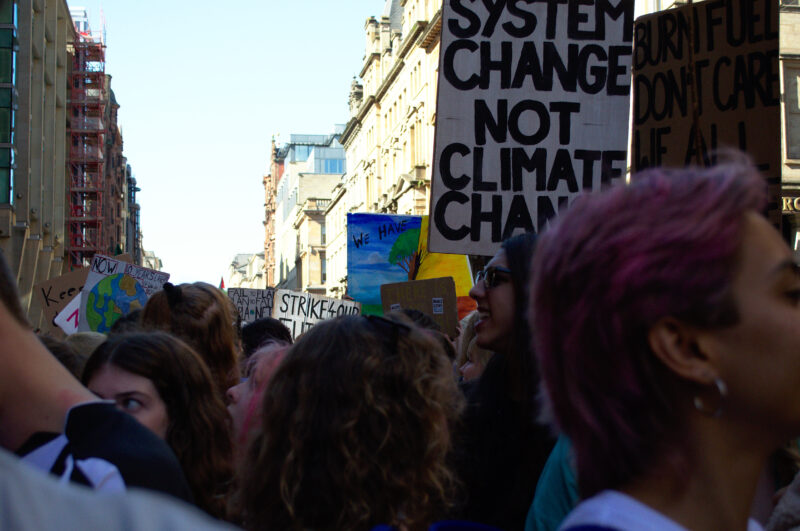November 13th marked the culmination of the two-week COP26 Climate Change Conference in Glasgow. The key headline is that participating nations renewed the commitment to prevent global warming from exceeding 1.5°C above pre-industrial levels. United Nations News reported that more than 120 countries, representing around 90% of forests worldwide, pledged to cease deforestation by 2030. The United States and European Union led more than 100 countries in a pledge to cut methane emissions by 2030, and more than 40 countries pledged to cut down on coal emissions, which scientists maintain is one of the leading contributors to CO2 emissions. But the conference was not without its concessions. During the final push, China and India spearheaded the revision of an earlier draft of the agreement which pledged to “phase out” coal power, diluting the pledge to “phase down.”
The reaction to the Glasgow Climate Agreement has been lukewarm. Though COP26 President Alok Sharma stated that “we can say with credibility that we’ve kept 1.5 degrees within reach,” he also acknowledged that “its pulse is weak. And it will only survive if we keep our promises.” This is perhaps a reference to past promises that have been broken. The 2009 Copenhagen Climate Conference included a pledge from the world’s richer nations to provide $100 billion per year from 2020 onwards in climate finance to developing countries. This was not achieved in 2020, and the BBC reports that is unlikely to be achieved until 2023.
UN Secretary-General António Guterres added that “it is an important step, but it is not enough,” though he conceded that “we have some building blocks for progress.” The Economist reported that one of the most notable achievements from the conference was the revision of the timeline for strengthening pledges. As part of the 2015 Paris Climate Agreement, participating countries agreed to strengthen their pledges every five years. But the Glasgow Climate Agreement will ensure participating countries strengthen their pledges at the next COP Climate Change Conference in November 2022.
The Glasgow Climate Agreement does provide building blocks for progress. The pledges certainly exhibit growing concern around environmental issues and awareness that time is running out. But they should be treated as a starting point. They represent a rough blueprint for meeting the 1.5°C targets rather than a comprehensive plan. In their current form, they are not ambitious enough to substantially address the current climate crisis and associated humanitarian suffering. Reuters reported that the pledges coming out of Glasgow will keep the rise in temperatures to 2.4°C — almost a whole degree above the 1.5°C targets. Then, nations are not responding with enough urgency.
Delegates from countries particularly vulnerable to the effects of climate change echo this sentiment. The Maldives’ top negotiator stated that the pact “was not in line with the progress needed” and that it will be “too late for the Maldives.” Barbados Prime Minister Mia Mottley stated that “two degrees is a death sentence.” Small island nations are particularly vulnerable to the effects of climate change and have already begun to experience severe flooding. At least eight islands in the Pacific Ocean have already been submerged by rising oceans. Similarly, Ugandan activist Vanessa Nakate pointed to the devastating effects of climate change visible across Africa. “We are watching farms collapse and livelihoods lost due to floods, droughts, and swarms of locusts.”
Climate change poses an ever more menacing threat to international peace and security. Al Jazeera reported that in 2020, more people were displaced by extreme climate than conflict, with 55 million people forced from their homes due to climate-related events such as rainfall, droughts, desertification, hurricanes, and rising sea levels. Such climate-related events are only increasing in frequency and intensity. But the nations that are already experiencing the catastrophic effects of climate change do not necessarily influence to push for further change.
Many of the major pledges were driven by larger, richer, and more influential countries such as the U.S. and members of the European Union. Though climate change is affecting these countries, the immediate impact is less devastating. UN Secretary-General António Guterres summed it up well: “The approved texts are a compromise. They reflect the interests, the conditions, the contradictions and the state of political will in the world today.” The Glasgow Climate Agreement is a reflection of political influence and will rather than a convincing plan to tackle the urgent state of the climate crisis. The key lesson coming out of Glasgow is that nations must do more to meet the real-world impact of climate change. When participating nations come to strengthen their pledges in 2022, they must allow those most significantly affected a more substantial seat at the table.
- 50% Rise In The Number Of Wildfires By 2100, According To Environmental Report - March 3, 2022
- The UK Joins the US in Urging its Nationals to Leave Ukraine Amid Growing Concerns Around a Russian Invasion - February 16, 2022
- Environmental Emergency Raises Questions Over Culpability In Peru Following Oil Spill - January 30, 2022


